#donor base
Explore tagged Tumblr posts
Text

Chris Stoddard - CEO of RaiseMore | Charity Fundraising Expert
Chris Stoddard is the CEO of RaiseMore, an organisation dedicated to helping small charities maximise their fundraising efforts. With over 35 years of experience in the charity sector, Chris is an international speaker, author, and expert in charity fundraising. He has successfully raised over £20 million for charities globally. Chris provides a range of services, including donor base building, large donation attraction, in memoriam giving programmes, and grant applications. Visit: https://chrisstoddardfundraising.co.uk
#Chris Stoddard#RaiseMore#CEO#charity fundraising#donor base#large donations#in memoriam giving#grant applications#small charities#international speaker#author
1 note
·
View note
Text

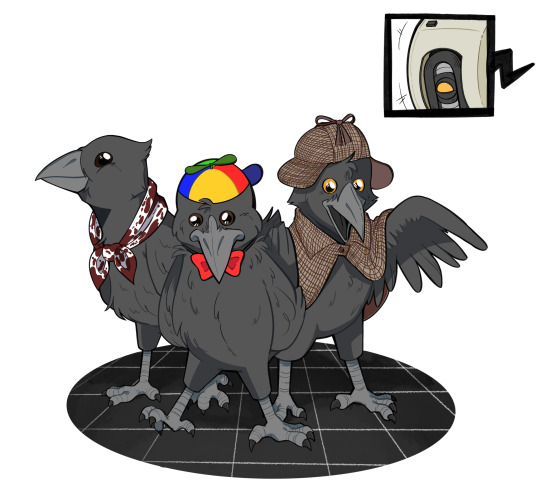
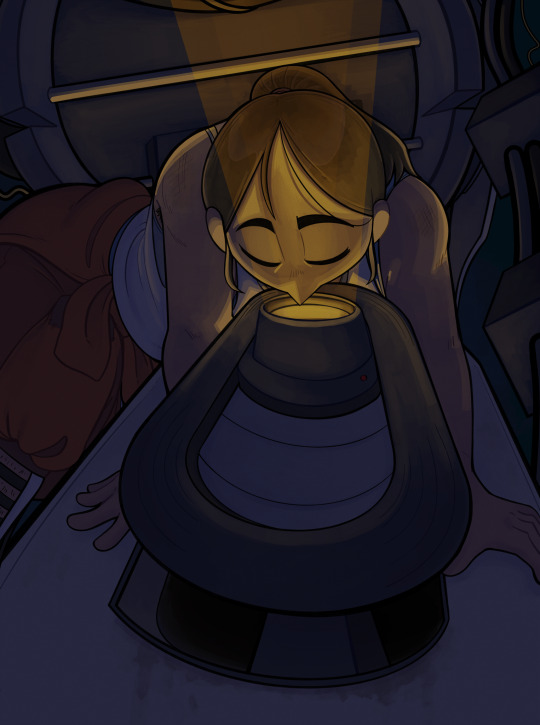
Misc portal things inbetween projects
#2022#2023#digital#portal#glados#mr. chubby beak#chelldos#chell#the first one is based off of an image I found of GLaDOS’s p1 model flipped upside down#and she looks like she’s flipping the bird lol#the second is for a kofi donor who i still don’t know who you are but if that was you. here u go#poor chell’s eyes are going to be burnt from being so close to that optic
791 notes
·
View notes
Text
.
#idk if this is an unpopular opinion but i genuinely operate on the assumption that the writers never think of the storylines#(and the indications of their writing choices in the broader frame) as much as the fans do#not in the way that im criticizing their intelligence or anything like that i just dont think this is the type of show written like that#like idt when they were writing the sperm donor storyline they were considering buck's broader storyline re being conceived as spare parts#or that what name the characters call buck has that much of a deep meaning like yes i have my own headcanons about tommy calling buck evan#but idt it was a direction given to lou because tommy is meant to be seen as special/different from other LIs/characters#i dont even think they considered the moment buck told his parents not to call him that#not saying nothing has staying consequences in the show obv but it's like whatever the character has to get from it happens in that arc and#then we move on#there are some defining traumas that come back like bobby's family madney and doug and eddie losing shannon#but i usually watch the storylines contained to that arc#not as a part of the lore that the writers will always be vigilant of as they keep building on these characters#at least not to the degree a fandom does#this is why i never speculate based on previous storylines l#not beyond “this would have a lot of potential if they went that route”#no one in that writers room thinks about character lore and the nuances of characterization as obsessed fans is what ill say#does*
21 notes
·
View notes
Text
So the Seraphim only take orders from certain people they've been programmed to follow (namely the Vegapunks and the Gorosei), but also they do take orders from individuals who possess an authority chip. Between that and the knowledge that the Seraphim are cyborgs, it makes me wonder...
Like, do they have somekinda control chip installed somewhere in their bodies (brain, spine?) that acts as the thing that forces them to follow orders and not act (too much) on their own will? 'Cause would the existence of an authority chip, a thing that essentially "sends out orders", not also imply the existence of something that recieves the order (like other than their brain) and forcibly puts it into motion? Something similar to whatever visual scanner+database combo Vegapunk installed into Kuma that allowed him to instantly recognize certain people and whether or not they were enemies or allies to him (at least as far as the WG thinks)
'Cause if so, like. I wonder. Could you remove that chip and basically free the Seraphim from being just borderline-mindless flesh robots?
In that scenario... what would they become?
Because, like, we don't know how much Free Will the Seraphim even have, how developed their minds are? Are/would they be fully functional human beings (if immature because they're still kids) who have just had half their mind essentially turned off so they don't think about anything else except following orders? If you freed them from the WG's control would they be able to live and function freely just like Stussy's clone can? But when being under that kind of control is all they've ever known, would they know how to function? Like what do you do, where do you go, who do you become? Who are you to begin with, does that even matter? What about your relation to the person you were cloned from, what does that mean? Are you doomed (🐊🦩🦇) or expected (🦈🐻🐍🦅) to become just like the person you were cloned from? Do you even want that? What will having that kind of freedom to do and become whatever you want even mean to someone who has never known what it means to even want something for themselves?
(But also, depending on who you were cloned from, would people even trust you enough to allow you go free and live your own life, or would you be deemed a threat by simply existing because you are the clone of a horrible, heinous person?) (Of course, we know existing is not a crime, and no one is born into this world a criminal. But we also know the World of One Piece does not always think this kindly)
#Moon posting#OP Meta#Also how likely would it be for S-Croc to have removed his control chip on his own because he didn't want to take orders anymore#Like I doubt he'd try Brain Surgery on himself so it'd have to be like. Relatively accessible to him. Surely. Like somewhere on his spine#Probably not on the outside though ala Raimi Doc Ock. Like it'd still probably inside the flesh#I'm just saying if there was any particular Seraphim who'd seem The Most Likely to break free from the WG's control#I'm sorry if I'm incoherent I think I caught a cold lmao#Like I'm thinking about poor S-Bear and like. On one hand I'd love it if he could get along with Bonney and stuff#But also like S-Bear is not Kuma. He shouldn't even be considdered Bonney's (step) brother like they don't have to be family or anything#So imagine if people's expectations of what S-Bear should be like based on Kuma were projected onto the poor angel#Or the expectations of becoming Honorable Powerful Men was forced onto S-Hawk and S-Shark while knowing they don't compare to the OGs#Because they're ''just clones''. So they can only ever exist in the shadows of their DNA donors#Or the Naughty Boy Gang being doomed to become horrible nasty people who will massacre and oppress innocents for their own gains#I'm just. The Seraphim are so INTERESTING. I'm so curious about them
17 notes
·
View notes
Text
This show is trying to kill me.
#amc iwtv#iwtv spoilers#iwtv s2#iwtv#interview with the vampire#amc interview with the vampire#loustat#louis de pointe du lac#lestat de lioncourt#armand#iwtv theory#francis bacon#the oresteia#Three Studies for Figures at the Base of a Crucifixion#basquiat#losing my mind#palma vecchio#Adoration of the Shepherds with a Donor#the vampire armand#interview with the vampire amc#the vampire chronicles
24 notes
·
View notes
Note
Would Tarn every admit to imprinting on carrier? Like “Well of course we are married—*goes into some long speech about family and sparkling dynamics that some how includes megatron*” or is it just a silent agree between everyone that yeah these two are together but we just gonna poke around that.
That Idiot Sandwich didn't even know he imprinted. Tarn is a mech of extremes, so he's an overachiever to the max.
Nickel and Kaon formed a powerful blockade against Vos' machinations to convert Tarn to his tastes in the berth.
Shoot, because Kaon's dreams of a wedding gets dashed since Tarn isn't getting a clue, he puts in the paperwork of a bonded couple by witnessed Conjunx Ritus.
Tarn helps out with your carriage, and you debrided the active infection on his face. It fits the Acts enough.
It gets approved. By who? No one knows, but everyone starts talking because it's Tarn. That Tarn. As in Tarn of the Decepticon Justice Division. Y'know, Megatron's biggest fan-boy?
That Tarn got married?! To a living mech!? Really!?!?
Of course, no one knows until the DJD starts coming across other Decepticons that's just going, "Congratulations! I think..."
Tarn misunderstands them as a picking up duties necessary to the Decepticon cause and its roots.
Other Decepticons: Holy shit, this slagger reproduced-
Now, there are so many rumors going around with about Tarn's never seen bonded. Like buckwild rumors like "Megatron gave Tarn a defective clone" and "It has to be an Autobot trap" and "What if High Command ordered him to check if his abilities could be passed or negated?"
And then it devolves into what kind of crazy, horrifying Pits of tortured debauchery or witchcraft is his bonded capable of. Like, who the hell would pledge loyalty to such a mech!?
Meanwhile, you're in the ship trying to coax the guy into a different position because your knees and thighs are too exhausted.
#ask#transformers#transformers idw#idw#mtmte#tarn#reader insert#cybertronian!reader#nickel#kaon#pregnancy#bitlets#sparklings#the donor clause au#cybertronian culture#maccadam#my writing#its a massive game of telephone based on misunderstandings
65 notes
·
View notes
Text
a group of survivors in a post apocalyptic world stumble upon a lonely little house on the edge of a forest. beside the house is a single grave, inside the house is android whumpee.
they've been there, alone, for years. they're visibly excited to have company, though there's this melancholic air and weight to everything they do. they don't have food for the survivors - they never bothered keeping any considering they don't need it - but they do have medicine and blankets and tools, and they're happy to share.
the survivors all flash each other guilty looks. because while they appreciate the supplies, that isn't what they need. one of their companions is an android, and in desperate need of repair. what they really need is parts.
parts that android whumpee almost certainly has.
when they admit this, whumpee goes silent. and then they readily agree.
when the survivors ask them if they're sure, that this will render them nonfunctional and as good as dead, whumpee tells them that the grave outside belongs to their owner. whumpee had been their faithful, beloved companion for over fifteen years. whumpee had tended to them in their final days, as infection from a wound they didn't have the means to treat slowly took them. whumpee had held their hand as they died. whumpee had buried them beside their shared home.
whumpee has not wanted to be here anymore from the moment they lowered the only person they've ever loved, their body lovingly wrapped in their favorite blanket, into their grave. for ten years they've wanted nothing more than to lay beside them and sleep forever.
but they stayed. to tend to the house, to their owner's grave, and maybe to finally help someone the way they couldn't help their love. and being essentially an organ donor for another android, one who still had a reason to live and people who loved them, was good enough for them.
"you can have the house. everything in it. it's all yours." whumpee said, unbuttoning their shirt so the group mechanic could more easily get at their chassis. "take any spare parts you want, as well. i won't be needing them."
they paused, looking up so they could meet the survivors' eyes. "just bury me next to them. please. it's all i ask."
the android survivor, the one they were giving their life for, reached over and gripped their hand. "i will. i promise."
whumpee gave them a small smile, then took a deep breath to settle themself. they pulled their shirt off, and sat propped up against a wall.
"it was nice meeting you all." they said.
"you too." one of the survivors responded. "thank you so much. for everything."
whumpee fixed their eyes onto a picture of their love that they'd hung on the wall - happy, healthy, alive - and powered themself off, content with the knowledge that they'd never power back on again.
#whump#whump writing#android whumpee#robot whumpee#suicidal ideation#assisted suicide#self sacrifice#character death#mine#ough. crying at my own damn writing again#i like to think that the survivors do keep the house#it's sorta like their home base#android survivor uses the strength they've regained from the donor parts to dig whumpee's grave just like they promised#and the survivors hope that if there is an afterlife that it lets androids in too so whumpee and their human can be together again
30 notes
·
View notes
Text
even if i am not hyperfixating on a character anymore you must know that they live on as parts taken and incorporated into my OCs
#yep the blorbos are still there! literary organ donors#just ask me which characters are based on which blorbo hehe
4 notes
·
View notes
Text
do you have some cashish lying around? some disposable income? are you gripped with the capitalist urge to spend money this weekend but burdened by the understanding that, hey, that’s probably just the consumerism trained into you and you don’t actually need a six egg cooker and actually waiting for the water to boil is fine, what’s even the point of a one trick pony like that?
but you still need that itch scratched. that money spending high. consider giving to your non-profit of choice next week!
it’ll be giving tuesday on the 28th, which is a day that always happens the tuesday after american thanksgiving, and is meant to ~counter~ black friday and cyber monday’s utter consumerism. spend on non-profits instead of capitalism!
it also means most of the international ngos are running match campaigns! what does that mean!! your donation is gonna get matched, usually with a limit on the amount and with a deadline (ex your gift will be matched until they reach $50k by midnight, 11/28).
here’s a few places doing matches for giving tuesday!
-doctors without borders
-international rescue committee
-save the children
-planned parenthood
-heifer international
and if you’re not in a place to give, don’t worry! getting involved in social is also important (seeing people just talk abt the entertainment community fund on my dash during the actors strike was incredible).
#at the end of the day#giving tuesday#isnt rly a special day#its just a fun little day to get you to remember to donate#which is great bc americans in particular love deadlines and matches#this just a reminder to donate really#and not to judge nonprofits based only on their overhead percentages#bc ppl deserve to be paid and guess what#some of us work in nonprofits#and it costs money to raise money#ask me more abt cost to acquires and donor lifetime values#and i will start crying
8 notes
·
View notes
Text
It logically makes sense but it didn't occur to me before that menopause increases one's hemoglobin
#i mean it was the first assumption i made while reading the blood donor handouts#and they had some different recommendations for women based on age
3 notes
·
View notes
Text
.
#had another novel idea based upon that news story about the mosaic at Armageddon being moved to the Museum of the Bible#and how it dates back to the time of Christian persecution by the Roman empire#and yet one of the chief donors to the construction of the church it’s in was a centurion#and now I have this character in my head who is the cynical and ambitious wife of a centurion#who likes him well enough before he converts but is disgusted and disappointed in him afterwards#not because he’s switched religions (this is just the Unknown God right?) but because he’s behaving like a ‘weak’ man#in deferring to her judgment and investing his own time in their children#and fraternizing with people so below their class and worthless in their utility#so she’s like. keeping his secret because Honor. but also hates him for embarrassing her in front of the slaves.#and then she finds out that Christians gather at NIGHT like the cult of BACCHUS?? and do CANNIBALISM?? nah fam she is not having it#but who knows….maybe. he’s found out and sentenced to die and maybe. she save him ¯\_(ツ)_/¯#which would be a whole other can of fascinating worms to unpack bc maybe he WANTED to be a martyr maybe he was PREPARED#but I digress#it’d be a deep-study project but I’ve always been fascinated by the Romans so#x#writing
9 notes
·
View notes
Text
I agree that producing babies for adoption is human trafficking but the people who should be punished are those exploiting poor women not the women themselves. And making poor women raise children not theirs is just cruel to born the women and children.
PHNOM PENH, Cambodia — The baby was not hers, not really.
Hun Daneth felt that, counted on that. When she gave birth to the boy, who didn’t look like her, she knew it even more.
But four years after acting as a surrogate for a Chinese businessman, who said he had used a Russian egg donor, Ms. Hun Daneth is being forced by the Cambodian courts to raise the little boy or risk going to jail. The businessman is in prison over the surrogacy, his appeal denied in June.
Even as she dealt with the shock of raising the baby, Ms. Hun Daneth dutifully changed his diapers. Over the months and years, she found herself hugging and kissing him, cajoling him to eat more rice so he could grow big and strong. She has come to see this child as her own.
“I love him so much,” said Ms. Hun Daneth, who is looking after the boy with her husband.
The fates of a Cambodian woman, a Chinese man and the boy who binds them together reflect the intricate ethical dilemmas posed by the global surrogacy industry. The practice is legal — and often prohibitively expensive — in some countries, while others have outlawed it. Still other nations with weak legal systems, like Cambodia, have allowed gray markets to operate, endangering those involved when political conditions suddenly shift and criminal cases follow.
When carried out transparently with safeguards in place, supporters say, commercial surrogacy allows people to expand their families while fairly compensating the women who give birth to the children. Done badly, the process can lead to the abuse of vulnerable people, whether the surrogates or the intended parents.
The practice flourishes in the nebulous space between those who can and cannot bear children; between those with the means to hire someone to bear their biological offspring and the women who need the money; and between those whose sexuality or marital status means they can’t adopt or otherwise become parents and those whose fertility spares them having to face such restrictions.
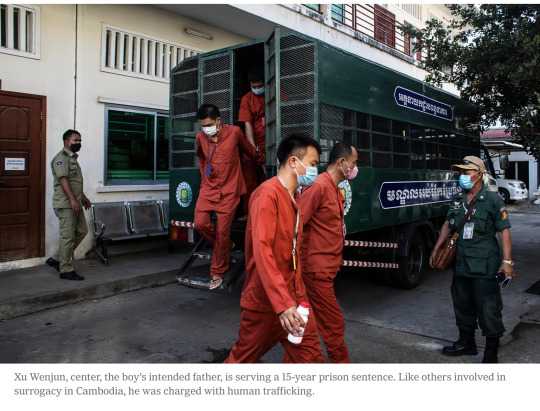

Cambodia became a popular surrogacy destination after crackdowns in other Asian countries nearly a decade ago. Foreigners flocked to newly opened fertility clinics and surrogacy agencies in Phnom Penh, the capital.
As the industry flourished, the government imposed a ban on surrogacy, promising to pass legislation officially outlawing it. The ill-defined injunction, imposed in a graft-ridden country with little rule of law, ended up punishing the very women the government had vowed to safeguard.
In 2018, Ms. Hun Daneth was one of about 30 surrogates, all pregnant, who were nabbed in a police raid on an upmarket housing complex in Phnom Penh. Although Cambodia to this day has no law specifically limiting surrogacy, the government criminalized the practice by using existing laws against human trafficking, an offense that can carry a 20-year sentence. Dozens of surrogates have been arrested, accused of trafficking the babies they birthed.
In a poor country long used as a playground by foreign predators — pedophiles, sex tourists, factory bosses, antique smugglers and, yes, human traffickers — the Cambodian authorities said they were on the lookout for exploitation.
“Surrogacy means women are willing to sell babies and that counts as trafficking,” said Chou Bun Eng, a secretary of state at the ministry of interior and vice chair of the national countertrafficking committee. “We do not want Cambodia to be known as a place that produces babies to buy.”
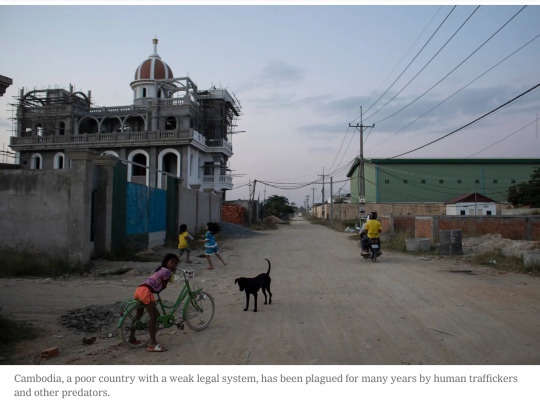

But applying a human trafficking law to surrogacy has imposed the heaviest costs on the surrogates themselves. Nearly all of those arrested in the 2018 raid gave birth while imprisoned in a military hospital, some chained to their beds. They, along with several surrogacy agency employees, were convicted of trafficking the babies.
Their sentencings, two years later, came with a condition: In exchange for suspended prison terms, the surrogates would have to raise the children themselves. If the women secretly tried to deliver the children to the intended parents, the judge warned, they would be sent to prison for many years.
This means that women whose financial precarity led them to surrogacy are now struggling with one more mouth to feed. The intended parents are separated from their flesh and blood. And surrogacy, a well-regulated practice in places like the United States, Georgia and Ukraine, has been relegated to the shadows in Cambodia.
From behind the bars of a courthouse in Phnom Penh, Xu Wenjun, the intended father of the boy to whom Ms. Hun Daneth gave birth, spoke quickly, his words tumbling out before the police intervened. He has been in prison for three years.
“My son must be big by now,” said Mr. Xu, dressed in an orange prison jumpsuit. “Do you think he remembers me?”
‘Where did he come from?’
Amid a cloud of mosquitoes, near a pile of garbage sodden from recent rains, a boy ran up to Ms. Hun Daneth, still in her factory uniform. She scooped up her son and sniffed his cheek, a sign of affection in parts of Southeast Asia.
Ms. Hun Daneth, now 25, decided to become a surrogate for the same reason as the others: debt, lots of it.
Over the past few years, Cambodian households have become some of the most indebted on earth, victims of a microfinance crisis. Once touted as a transformational tool for lifting families out of poverty, microfinance has in some countries, Cambodia included, devolved into a predatory scheme trapping millions in cycles of dependency.
Local banks compete to offer microfinance loans that can balloon fast. Ms. Hun Daneth said her family took out multiple loans, some just to service interest payments that exceeded 10 percent a month.
“At first it was a few hundred dollars,” Ms. Hun Daneth said, of her family’s burden. “Then it was thousands of dollars.”
Like nearly a million other Cambodians, mostly women, she had left the countryside to stitch together T-shirts and bras, gym bags and sweatshirts in factories. But a couple hundred dollars a month doesn’t go far in the cities.

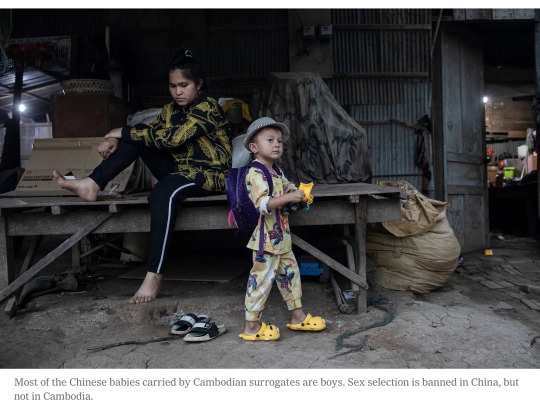
A scout at the garment factory where Ms. Hun Daneth worked told her of a way out. She could earn $9,000 — about five times her annual base salary — by acting as a surrogate.
She knew of villages outside Phnom Penh where imposing concrete houses, said to have been built from surrogacy payments, loomed over bamboo shacks.
“They paid off their debts,” Ms. Hun Daneth said. “Their lives could start like new.”
The scout was connected to an agency managed locally by a Chinese man and his Cambodian wife. Her sister ran luxury villas where the surrogates stayed.
Eight surrogates who spoke to The New York Times described chandeliers, air conditioning and flush toilets in the villas, none of which they enjoyed at home. Their meals were plentiful. The women dreamed about the money they would earn. They also thrilled at the notion that they were providing a desperately needed service.
“I was helping give someone a baby,” Ms. Hun Daneth said. “I wanted to give that joy.”
Mr. Xu, a prosperous businessman from the southern Chinese city of Shenzhen, was matched with Ms. Hun Daneth. The one thing he was missing, he told friends who spoke to The Times, was a son to continue the family line.
Most of the Chinese babies carried by Cambodian surrogates are boys. Sex selection is banned in China, but not in Cambodia. Commercial surrogacy is not openly practiced in China, despite official concern about the country’s plummeting birthrate after decades of a brutally enforced one-child policy.
In Cambodian court testimony, Mr. Xu said his wife could not bear a child. But Mr. Xu’s friends, who spoke on the condition of anonymity for fear of antagonizing the Cambodian authorities, said that his situation was more complicated: He had no wife and was open about being gay. Ms. Hun Daneth said Mr. Xu told her about his sexuality. L.G.B.T.Q. couples cannot adopt in China, and gay or single individuals are precluded from surrogacy in most countries where that practice is legal.
Perfect Fertility Center, or P.F.C., a surrogacy agency registered in the British Virgin Islands, showed rare sympathy for L.G.B.T.Q. intended parents, promising babies via Cambodia, Mexico and the United States. The company’s website is illustrated with photos of same-sex couples cradling babies.
P.F.C. was founded by Tony Yu, who turned to Cambodian surrogates for his own children. Mr. Yu, who is openly gay, said Cambodian lawyers assured him that his agency was legal.
It was a multinational operation that spanned continents. Mr. Yu partnered with a fertility clinic in Phnom Penh run by a Vietnamese person. There, a German fertility specialist trained Cambodian doctors. An Indian logistics expert flew in with eggs harvested from donors.
In 2017, Mr. Xu signed a contract with P.F.C., agreeing to pay $75,000 for surrogacy in Cambodia, according to documents reviewed by The New York Times.
Mr. Xu visited Ms. Hun Daneth at the luxury villa. He told her that the egg donor was a Russian model, and he later showed Ms. Hun Daneth and her husband photographs of a white woman with wavy hair standing next to a sports car.
Mr. Yu, the agency founder, said that many of its egg donors came from Russia, Ukraine and South Africa. The intended fathers were Chinese, and many were gay.
“Mixed-race children are popular with our clients,” said Mr. Yu.
For the Cambodian surrogates, being forced to raise children from other ethnicities can create additional strains in their families and their communities. The children’s features make it hard to explain their origins.
“People wonder, ‘Why does he have brown hair? Where did he come from?’” said Vin Win, 22, another surrogate who was arrested with Ms. Hun Daneth.
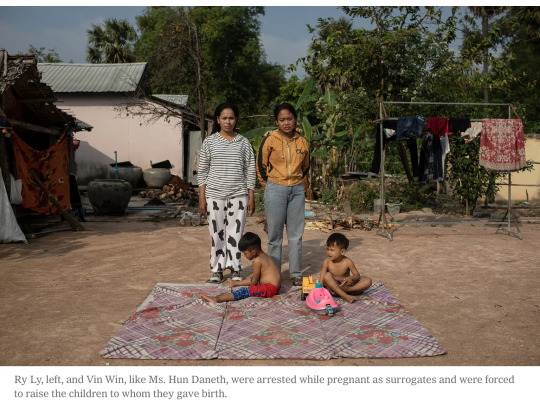
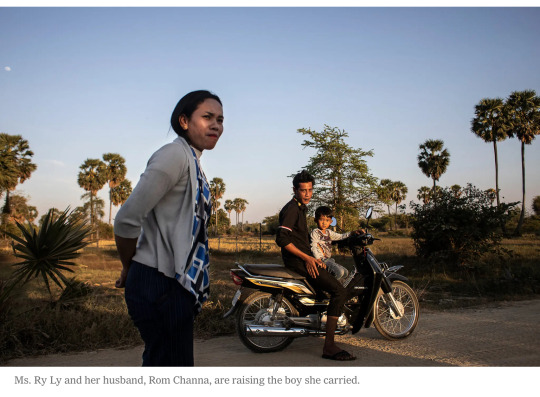
Ms. Vin Win’s husband resents the child she bore, she said. They have separated. She hopes the boy will get more than the third-grade education she received.
“I look at my son, and I feel pity because I think he should be living in a nice place,” Ms. Vin Win said. “This is not his real home.”
‘Disaster happened’
The police swarmed past the compound’s marble arches and burst into the two villas, handcuffing pregnant women who had been dozing on their pink-framed beds or lounging on sofas playing Candy Crush.
The police operation in July 2018 followed a regionwide crackdown on commercial surrogacy. Three years before, Thailand had banned the practice for foreigners, shutting down a cheaper alternative to surrogacy in the West, which can cost more than $150,000.
Two cases spooked the Thai authorities. One involved an Australian couple accused of refusing a baby boy with Down syndrome. A judge in Australia later found that the couple had not abandoned the child; the boy remained in Thailand, with the surrogate.
The other case raised concerns about baby trafficking after a Japanese man fathered at least 16 children by Thai surrogates. A Thai court eventually granted the man custody over most of the children after he said that he wanted a large family.
India and Nepal also limited surrogacy for noncitizens. In many of these cases, politicians spoke of the sanctity of the maternal bond and the purity of Asian women.
With options narrowing, Cambodia beckoned. Fertility clinics in Thailand moved across the border. Intended parents arrived from Australia, the United States and, most of all, China.
Ten Cambodian women who spoke to The Times, including the eight who were arrested in 2018, said surrogacy was their choice.

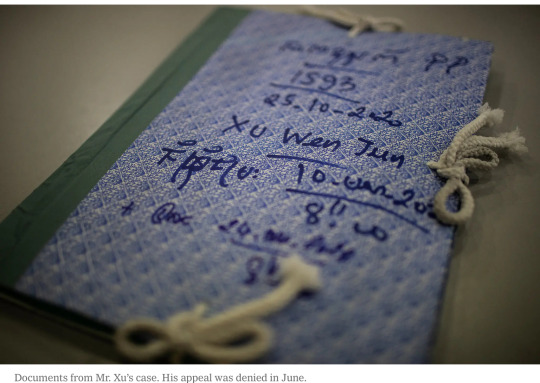
As the surrogacy business blossomed, a senior official from the ruling party questioned whether foreigners should be paying for access to Cambodian women.
With its compromised courts and pliant legal system, Cambodia has been plagued with exploitation, by foreigners and by its own citizens. The government of Hun Sen, the world’s longest-serving prime minister and a former functionary for the murderous Khmer Rouge, has been tied to systemic corruption and the erasure of human rights.
Late in 2016, the Cambodian Ministry of Health announced the ban on surrogacy, but did so without adopting new legislation making it a crime. In the resulting gray space, fertility clinics and surrogacy agencies continued to open up.
The raids began the next year. An Australian nurse and two Cambodian staff members at a fertility clinic that worked with surrogates were convicted of human trafficking.
Mr. Yu, who was not in Cambodia when the police raided the villas, said he’d had no idea that his agency was breaking any law. Lotus Fertility, one of the clinics the agency relied on to perform in vitro fertilization for surrogates, operated out of Central Hospital, a private facility with a strong political pedigree. The hospital’s director and deputy director are the daughter-in-law and son of Dr. Mam Bunheng, Cambodia’s health minister. The hospital has not responded to requests for comment.
“I wanted to do everything legally and openly,” Mr. Yu said. “With the fertility clinic, everyone said, ‘Everything is safe, everything is comfortable, they have a good background,’ so I believed them.”
“But then disaster happened,” he added.
Ms. Hun Daneth said she’d had a sense that she wasn’t supposed to talk too openly about what she was doing. Four other surrogates said they were warned by agency staff not to stroll outside the villa complex.
In documents for Mr. Xu’s payment to P.F.C.’s bank account, an addendum cautions: “Do not note surrogacy-related words when transferring money.”
A Cambodian employee of Lotus Fertility, who agreed to speak only if her name was not used, said that the clinic filed documentation stating that all the in vitro fertilizations were for prospective Cambodian mothers, even though it was clear many of the women were surrogates.
Lotus Fertility has closed. A representative for the clinic blamed the coronavirus for the closure.
In testimony this spring before the United Nations-linked Committee on the Rights of the Child, Ms. Chou Bun Eng, the government official, dodged questions about the children born of imprisoned surrogates.
“The committee does not take a position on whether surrogacy is wrong or right,” said Ann Skelton, a children’s rights lawyer and member of the committee. “But we are concerned about a situation that does not uphold the rights of the women, the intended parents and, of course, the children.”
‘Our babies are the crime’
Chained to a military hospital bed in August 2018, Ms. Hun Daneth delivered a baby with soft brown hair, a pale complexion and the same wide eyes as his intended father.
Another surrogate, Phay Sopha, gave birth sprawled on the cement floor of the military hospital, no midwife in sight.
“The baby came out, and I thought, ‘It looks Chinese,’” Ms. Phay Sopha said. “Then I passed out.”
After Mr. Yu, by his account, paid the police nearly $150,000, the surrogates were released. In total, Mr. Yu said he spent more than $740,000 trying to fix the situation, money paid in cash to intermediaries or to anonymous bank accounts.
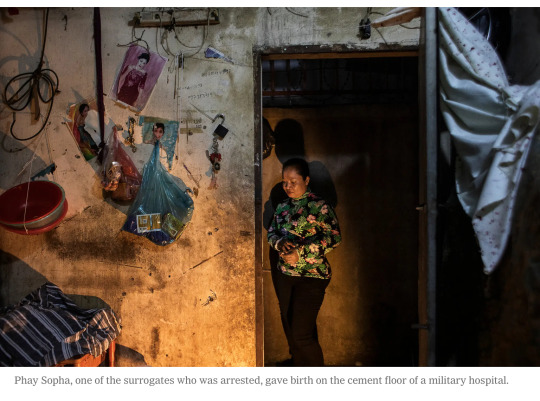

A spokesman for the Cambodian National Police, Chhay Kimkhoeun, questioned Mr. Yu’s claim.
“First, is there any evidence of what is said?” he said. “Second, if there is factual evidence, they can file a complaint.”
Ms. Phay Sopha now works at a garment factory, from 6:30 in the morning to 8 at night. She rents a boardinghouse room barely long enough to fit her outstretched body. The child, she said, is back in her village, being raised by her mother.
The government ordered a Christian charity, founded by Americans to combat child sex trafficking, to check up on the women after they gave birth, officials said. Some surrogates said they also had to report to the police station, children in tow.
“It was like we were criminals,” said Ry Ly, another surrogate. “Our babies are the crime.”
Most of the women are struggling financially. Soeun Pheap, aunt to Chan Nak, a surrogate who gave birth to twins, said her niece fed the babies water thickened with a squirt of condensed milk. After living for a while with her aunt, Ms. Chan Nak left abruptly with the babies. She sent another surrogate a message saying she was out of the country and would be returning without the twins.
Despite the surrogates’ promises to the court that they would raise the babies, a good number of the children are no longer in Cambodia and have been united with their Chinese parents, Mr. Yu said.
Mr. Xu, the Chinese businessman now in jail, went to Cambodia to try to extricate his child. He contacted Ms. Hun Daneth directly, even though the agency had warned him to keep a low profile. He bought toys and diapers for the boy, whom he called Yeheng in Mandarin, a name alluding to karmic perseverance.
Mr. Xu submitted a paternity test to the Chinese Embassy in Phnom Penh. In 2019, he secured a passport for the boy.
A worker from the Christian charity accompanied Mr. Xu to the police station to finish up paperwork. The founder of the surrogacy agency warned Mr. Xu that it was a setup by the police. Officers were waiting. He has been imprisoned ever since.
Representatives for the charity, Agape International Missions, would not comment on Mr. Xu’s arrest.
In 2020, Mr. Xu was convicted of human trafficking and sentenced to 15 years in prison. In June, his appeal was denied.
“Are they serious that he is trafficking his own child?” said May Vannady, Mr. Xu’s lawyer, waving a notarized copy of the paternity test.
Mr. May Vannady says they will take their appeal to the Supreme Court. Ms. Chou Bun Eng, the government official, said that the conviction should stand. She suggested that Chinese gangs wanted to harvest organs from children born of Cambodian surrogates.
This spring, Ms. Hun Daneth took a day off work and rode a motorized rickshaw to the appeals court in Phnom Penh. Mr. Xu didn’t mean any harm, she told the judge. He only wanted a son. He was not a baby trafficker.
Still, she told the court, she had grown attached to the boy. After the hearing, Ms. Hun Daneth said she had decided to move back to the countryside because she did not want anyone to kidnap her son. She didn’t like it when Chinese-speaking people showed up at her home.
“No one will take him from me,” she said. “He is mine.”
#cambodia#surrogacy#human trafficking#Exploitation of women#Surrogacy destination#China’s one child policy#A lot of unmarried men who want children#Sex selection in cambodia#Sex selection in surrogacy#Sex couples and surrogacy#It’s men#Most Lesbian couples don’t need surrogates#Picking egg donors based on appearance#Surrogacy and children with disabilities
14 notes
·
View notes
Text
Ehehehehehe I started donating (when I can fucking remember to write a check) to two charities, both bc I genuinely support their work and believe that they're not scamming donors (like the one uses 90% of every dollar you donate for research, 8% for fundraising, and 2% for management. While march of dimes is VERY UPFRONT ab only using 10% per dollar for research for premature babies) and bc I wanted to get "free" seasonal address labels and other donor gifts in the mail
And the one charity had asked me if I wanted them to pass my info to other charities they work with to send me donor requests and WHOO BOY DID THEY EVER! I got address labels the other day from ASPCA and one I do donate to, and today I got 4 different donor requests sgfsfsfsfsfs, 2 gave me address labels >:)
My aunt used to donate to a lot of charities and when she passed I was tasked with shredding her old mail/documents bc I looove shredding shit and my God did she have a lot of address labels and notepads from charities sgdgdgdgdg that's gonna be meeeee
#marquilla#the 90% one gives the best donor gifts man like based off what mom gets: Christmas cards. greeting cards. pens. notepads. SOCKS (once a#year Christmas socks). gift wrap that no one but my aunt used sgdddgdg and so so many address labels#i have a lush bag full of the cards agsgggdg i have like 50 bday cards alone#oh and stickers! sometimes they'll send you stickers alongside the cards or labels#i saved all the stickers from my aunt lol so so many#sure i could have just ordered address labels but this way im helping charity and i get cute seasonal ones!
1 note
·
View note
Text
The midjourney stuff just reminds of when we were trying to find a new platform to host the ao3 donation form, and companies kept trying to tell me about all their "ai" features that would track donor engagement, and figure out the optimal pattern to email individual donors asking for follow up donations, and all the ways they suggest we manipulate people into staying on our websites. It was a great way to filter out who either wasn't listening to us when we described our ethics and donor base, or just didn't believe us.
Now granted ao3 is a unique case based on a) the amount of page views we get in any given time period and b) the fact that most donors absolutely do Not want to be identified as such anywhere, (the default "list of recent donors" module got nuked Immediately) but it surprised me some that the concept of "donors who value their privacy and would be furious at even the whiff of AI" is unique. Some of us really are just existing in different worlds.
#I just started dropping '2.5 Billion page views a month'#into conversations as early as possible bc they would Not believe me otherwise#it was right up there with having to say 'csam attacks' to get them to take my compartmentalization of information concerns seriously#turns out those are the magic words#otw#op
48K notes
·
View notes
Text
i think we could increase involvement in local politics many times over if we framed it as a vehicle for gossip and intrigue that coincidentally (worryingly?) also includes exercise of governmental powers
#the shit-flinging that happens. the deep lore that is unearthed oh mannn#and have you ever checked someone’s campaign finance filings? show me your donor base and i’ll tell you who you are
0 notes
Text
One thing that makes my life oh so hard is that I don't actually care for most of the popular dupes that much. I don't Not like them to be clear, I do like them, I just also feel like I'm staring at a color blind test whenever I see ppl talk abt their favorite dupes and everyone involved is obsessed with the same like 3 dupes that I just sort of like well enough and nothing more. Sorry women I don't actually care abt Bubbles that much 😔
#rat rambles#oni posting#this also applies to ari and pei Im sorry I do like them I just dont get the hype 😔#I feel like Im the one guy sitting here with jean burt and quinn as its favorites#especially burt like no one gives a shit abt my poor boy#although tbf I didnt care too much abt him at first until I kept getting him as a part of my initial threes and he rapidly stole my heart#and jean stole my heart the millisecond I realized theyre nonbinary because we need more old nonbinary characters so bad#and quinn is another that mostly stole my heart from being one of my first three but they also are just delightful in general#tbc this isnt lore bias quinn and jean were both top favorites of mine before I found out their donors have lore#but yeah idk I guess I just expected more ppl to have random favorites based on their own gameplay experiences or smth#Im guessing the ari and bubbles love comes from the animations and for pei idk blue hair and pronouns or smth#yknow at least two of the three are not white with bubbles being a shrug#ty oni for not making all of the probably asian characters probably japanese#jean and ren are the two probably japanese characters to be clear#pei is probably chinese if Im remembering correctly?#good for her 👍#I should rly do some background checking on everyones last names even if I probably wont learn that much from it#mostly because there's at least a couple of them that are named after like scientists and shit#and also last names aren't a perfectly consistent way of pinpointing ethnicity ofc#Im sure several of them have very white ass last names that arent white
0 notes